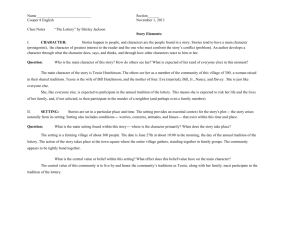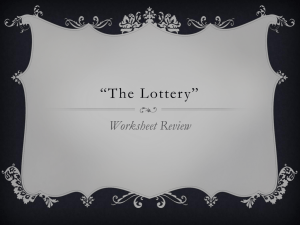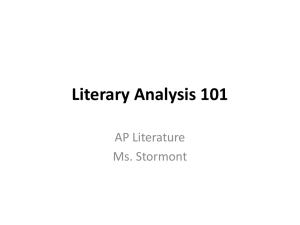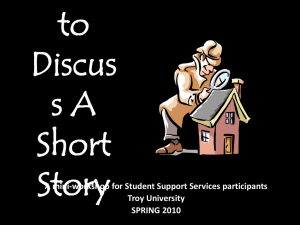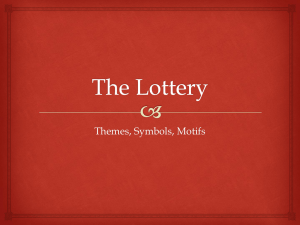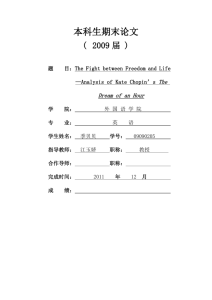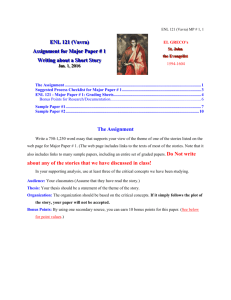File - John Lim`s Year In Literature
advertisement
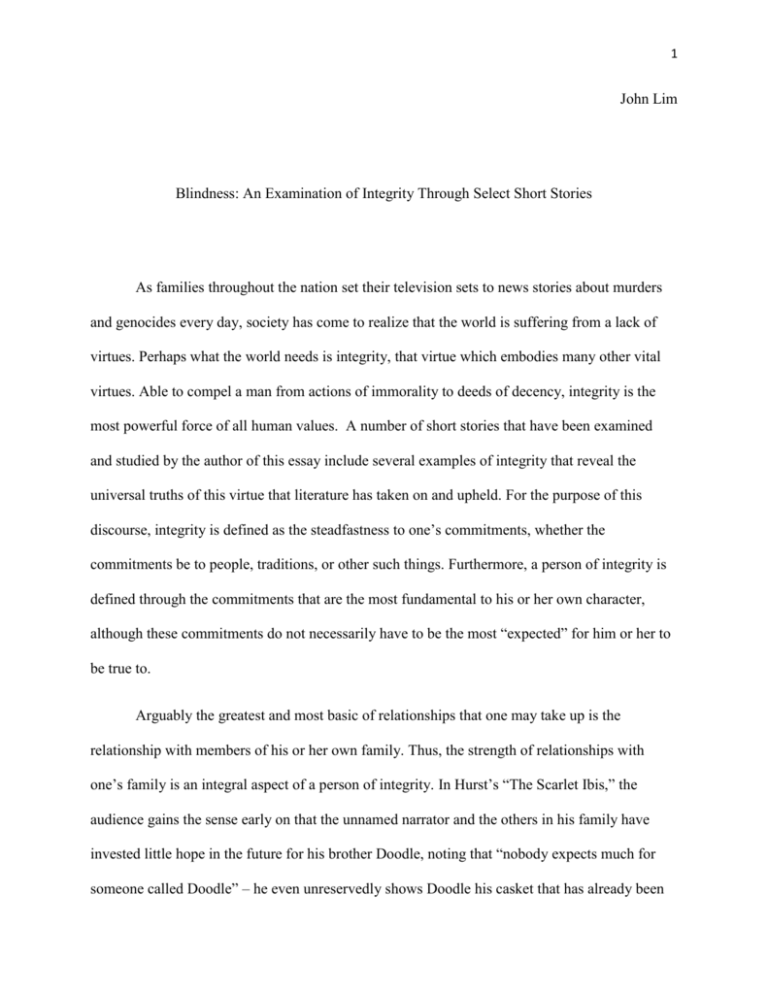
1 John Lim Blindness: An Examination of Integrity Through Select Short Stories As families throughout the nation set their television sets to news stories about murders and genocides every day, society has come to realize that the world is suffering from a lack of virtues. Perhaps what the world needs is integrity, that virtue which embodies many other vital virtues. Able to compel a man from actions of immorality to deeds of decency, integrity is the most powerful force of all human values. A number of short stories that have been examined and studied by the author of this essay include several examples of integrity that reveal the universal truths of this virtue that literature has taken on and upheld. For the purpose of this discourse, integrity is defined as the steadfastness to one’s commitments, whether the commitments be to people, traditions, or other such things. Furthermore, a person of integrity is defined through the commitments that are the most fundamental to his or her own character, although these commitments do not necessarily have to be the most “expected” for him or her to be true to. Arguably the greatest and most basic of relationships that one may take up is the relationship with members of his or her own family. Thus, the strength of relationships with one’s family is an integral aspect of a person of integrity. In Hurst’s “The Scarlet Ibis,” the audience gains the sense early on that the unnamed narrator and the others in his family have invested little hope in the future for his brother Doodle, noting that “nobody expects much for someone called Doodle” – he even unreservedly shows Doodle his casket that has already been 2 built because everybody “had believed he would die.” However, by the time Doodle is five years old, he is still unable to walk, and the narrator decides to take on the challenge to teach his brother how to walk. This section of the storyline exhibits great integrity relating to the health of a relationship with a family member by showing the dedication that the narrator – a person of true integrity – possesses to make his brother more normal and acceptable out of the realm of his own family. Indeed, although his efforts ultimately lead to his brother’s tragic and unfortunate death, the narrator’s actions are defended by his intent, which is not for him to gain respect from others for what he had done for his brother, but rather to better him because he loved Doodle and wanted him to be accepted by others. Chopin’s “The Story of an Hour” depicts another situation of integrity through a family relationship, this one of a marriage. However, Chopin’s work explores not the strengths of the marriage but the faults of the relationship and the ecstasy the protagonist Louise Mallard experiences through the rush of liberation by the death of her husband. Following the immediate emotional crush of learning that her husband has been killed in a train accident, she begins to realize the benefits of a life without him – a life without a “powerful will bending hers in that blind persistence with which men and women believe they have a right to impose a private will upon a fellow-creature.” This marriage, which has placed an emotional burden upon Louise by having to make herself submissive to her husband, was a ruined one, as likely were many others in Chopin’s time, when many women were becoming unsatisfied with their status in society and within the family; indeed, by the end, the audience comes to understand how great of a tragedy this marriage was on Louise’s life, when, upon seeing her husband alive at her front door, she dies “of heart disease – of the joy that kill.” At first glance, the infirmity of the marriage may lead one to believe that Louise did not remain true to her marriage – undoubtedly an important 3 part of her life – and thus is not a person of integrity. However, Louise, as seen through her selfempowering thoughts following Brently Mallard’s death, is a person of integrity who embraces less the power of the relationship with her husband and more of the relationship with herself. Another facet of integrity is that concerning the commitment one may have with tradition. Generally, people are attached to respectable customs; however, as seen in Jackson’s “The Lottery,” this kind of integrity can be morally controversial, since it is completely dependent on what kind of ideals one is accustomed to. In the short story, the lottery is held alongside the archaic adage “Lottery in June, corn be heavy soon,” suggesting that their sacrifice was originally intended to bring a good harvest. Indeed, most of the townspeople do not actually know the true process of the tradition or understand why the lottery is held anymore, as the event is such an old custom. Still, everyone in the town conforms to partaking in the tradition, pressured especially by the intimidating Old Man Warner. Those who act against the tradition, such as Tessie Hutchinson, who ironically ends up being the victim of this year’s killing, are considered as some kind of traitors who do not embody the ideals of the rest of the town. As seen through the text, Tessie is not like the others in the town, persistently shouting that “it isn’t fair.” The audience is left to assume that this mysterious “it” is the entire concept of the lottery – that this tradition of randomly choosing an innocent person in the town and mindlessly stoning him or her to death is unfair. In this sense, all of the other townspeople are persons of integrity, while Tessie Hutchinson, as the violator of the tradition, is considered as being without true integrity. For the small town, maintaining fidelity to this blindly violent tradition is essential to being an acceptable member of the town and ultimately to being accepted by the others. However, from an outsider’s point of view, and from the point of view of anyone in their right mind, a 4 commitment to such an atrocious tradition can be, while respectable, completely against the morals that define integrity on the level of common sense. Thus, it is not solely that a person of integrity is defined through the wholehearted yet blind commitments which one may take up with traditions or people. Rather, a person of integrity examines his or her own commitments from an external point of view and sees if they do indeed align with the morals that people are born with – that people ought not to be subversive or inferior to any others, that killing is unjust. The strongest commitment that a person of integrity possesses is the commitment one has with him- or herself. Louise Mallard reevaluated her life following her husband’s death and saw that the vital relationship that exists with herself – constituted of being true to herself and her morals – was oppressed by her marriage. Tessie saw the lottery as unjust, finding it against her own morals, but her thoughts and actions of true integrity were destroyed by the other townspeople. Indeed, persons of integrity are not always those who silently live with the circumstances that they have been given. Instead, a person of integrity embodies the struggle for the betterment of society for others to enjoy.
